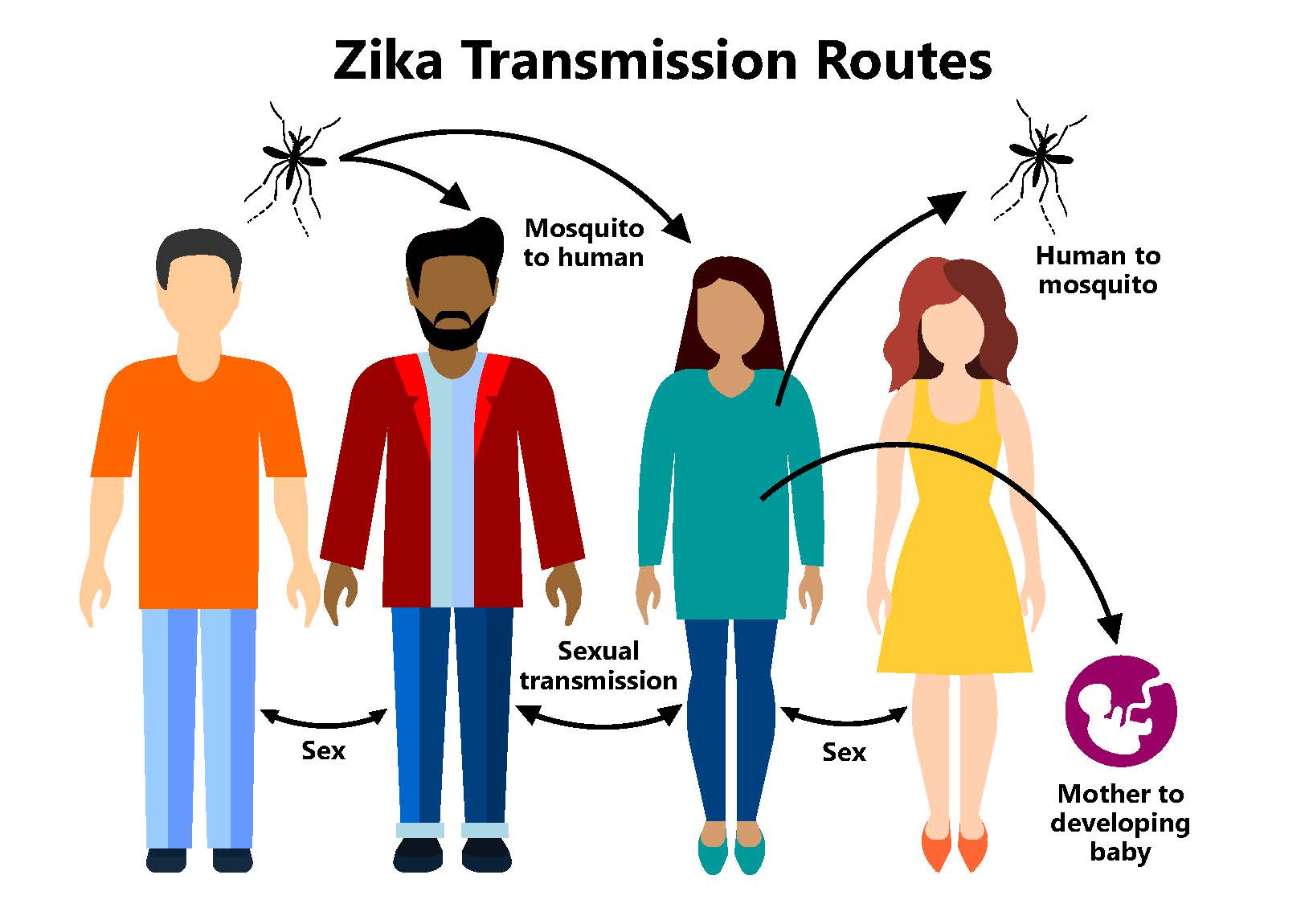Transmission
Zika is a virus that spreads to people in different ways. If you become infected with Zika, you may not know it because most people don’t have symptoms. Learn how Zika is spread so you can protect yourself, your family, and your community.
Zika is spread:
Through the bite of an infected mosquito
Mosquitoes that carry the Zika virus (Aedes aegypti and
Aedes albopictus) become infected when they feed on a person who has already been infected with Zika. These mosquitoes can then spread the virus to other people when they bite them.
Through sex with an infected partner (male or female)
You can pass the virus through vaginal, anal or oral sex, even if you don’t have symptoms.
From a pregnant woman to her developing baby
A pregnant woman who becomes infected with Zika can pass the virus to her developing baby during pregnancy or around the time of birth.
If you travel to
areas with Zika and are bitten by an infected mosquito
or have unprotected sex with someone who is infected, you could get the Zika virus and not even know it. Zika is a serious risk to a pregnant woman’s developing baby.
Zika can cause miscarriage, stillbirth, and severe birth defects.
Learn more about Zika transmission

Prevention
There is no specific medicine or vaccine for Zika.
Prevent Zika by avoiding mosquito bites while in areas with Zika
and practicing safer sex with a partner who has recently been to areas with Zika.
Pregnant women should not go to areas where there is an outbreak of Zika. If it is necessary to travel to other areas where Zika is a concern, talk to your doctor first about the risks and possible consequences of traveling. If deciding to travel, there are ways to help prevent Zika infection. Learn more about areas with Zika:
CDC World Map of Areas with Zika.
Anyone visiting areas with Zika can do the following to prevent Zika infection:
Prevent Mosquito Bites
During a trip to an area with Zika:
- Use
EPA-registered insect repellent. Remember to apply sunscreen first and then insect repellent.
- Wear long sleeves and long pants, when possible.
- Stay and sleep in screened-in or air-conditioned rooms.
- Use a bed net, as needed.
When you return: Continue using insect repellent for 3 weeks to prevent spreading Zika back home.
Learn more about mosquito bite prevention
Prevent Sexual Transmission: Spread the Word, NOT the Virus
Not having sex is the only way to be sure that you do not get or pass Zika through sex.
If you or your partner have recently been to an area with Zika, either do not have sex,
or practice safer sex by using condoms (male or female)
and dental dams during all types of sex, from start to finish:
-
Men: For at least 3 months after returning from an area with Zika.
-
Women: For at least 2 months after returning from an area with Zika.
-
Pregnant couples should either not have sex or practice safer sex for the duration of the pregnancy.
Prevent or Delay Pregnancy
Zika can cause severe birth defects in a developing baby. If you and your partner are planning pregnancy, talk to your doctor before traveling to any area where Zika is a concern (including Mexico). If you or your partner decide to go to these areas, delay pregnancy during travel and for a while after you return. Use an effective birth control method in addition to condoms during your stay in areas with Zika and after returning home:
-
If only the male partner travels: delay pregnancy for at least 3 months after returning.
-
If only the female partner travels: delay pregnancy for at least 2 months after returning.
-
If both partners travel: delay pregnancy for at least 3 months after returning from an area with Zika.
Examples of effective birth control methods include intrauterine devices (IUDs) and implants. Talk with your doctor about the birth control options that are right for you and your partner.
Couples who live in areas with Zika or frequently go to areas with Zika should talk with their doctor about their family plan for pregnancy.
Learn more about Zika and pregnancy